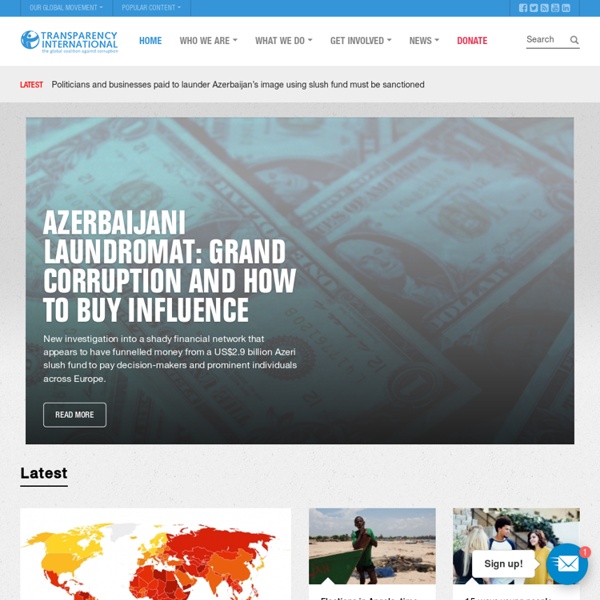



Peter G. Peterson Institute for International Economics Poynter. | Standing for journalism, strengthening democracy | Journalism training, media news & how to's Ca marche au Texas Par Susan Combs, Contrôleur général de l’État du Texas. Les dépenses publiques sont souvent perçues comme impénétrables, opaques au possible. Mais les contribuables ont le droit de savoir quel usage est fait de leur argent, les autorités publiques doivent donc leur rendre des comptes. (Illustration René Le Honzec) Le site Internet « Où va l’argent » lancé par l’État donne accès aux détails des transactions de toutes les agences publiques et des établissements d’enseignement supérieur. Voir où va l’argent Le bureau du Contrôleur du Texas lança le site « Où va l’argent » en juin 2007, offrant une vue sur les larges catégories de dépenses pour toutes les institutions et agences de l’État, telles qu’elles lui étaient reportées par celles-ci. Au-delà du bénéfice d’offrir au public l’accès aux données des dépenses, le bureau du Contrôleur découvrit un bénéfice interne à la priorité donnée à la transparence : rendre les opérations des agences plus claires pour les contrôleurs eux-mêmes.
Council on Foreign Relations Top 30 think tanks in the world 2011 The latest report of global think tanks rankings was released by the Think Tanks and Civil Societies Program (TTCSP) at the University of Pennsylvania's International Relations Program on January 20 this year. This annual report, named "The 2011 Global Go To Think Tank Rankings," the fifth edition of the kind, contains the most comprehensive rankings of the world's top think tanks, which has been described as the insider's guide to the global marketplace of ideas. A total of 6,545 think tanks in the world were contacted and encouraged to participate in the nominations process, and a group of over 6000 scholars, journalists, policymakers, public and private donors, think tanks, and regional and subject area specialists were involved. The nominations and rankings were based on the detailed set of criteria, including the think tanks' production of rigorous and relevant research, publications, and programs in one or more substantive areas of research. Fraser Institute Establishment: 1974
JournalNews | News & Information for Hamilton and Butler County, Ohio USAID and NGO transparency: When in doubt, hide the data by Till Bruckner, PhD candidate at the University of Bristol and former Transparency International Georgia aid monitoring coordinator In my last blog post on this website, I claimed that some NGOs had instructed USAID to hide part or all of their project budgets in a FOIA response, and praised others for their openness. Aid Watch subsequently contacted all NGOs mentioned in the piece for comments. In its response, World Vision denied ever having asked USAID to withhold budgetary information: World Vision has checked thoroughly with all of its relevant offices and found no record of having received notification of this FOIA request by USAID or any evidence that WV asked USAID to redact information in the documents requested of USAID by Bruckner. Referring to a letter from the donor agency, World Vision correctly pointed out that in the letter, “USAID did not state or imply that World Vision asked that this information be withheld.” USAID never did contact me again on this matter.
Identifying and Regulating Systemically Important Financial Institutions: The Risks of Under and Over Identification and Regulation Certain financial institutions are so central to the American financial system that their failure could cause traumatic damage, both to financial markets and to the larger economy. These institutions are often referred to as “systemically important financial institutions” or SIFIs. Among its numerous provisions, the Dodd-Frank Act, the comprehensive reform legislation signed into law during the summer of 2010, requires financial regulators belonging to the Financial Stability Oversight Committee (FSOC) [1] to designate those financial institutions that are systemically important.[2] Such SIFIs are to be supervised more closely and potentially required to operate with greater safety margins, such as higher levels of capital, and to face further limitations on their activities. This policy brief is intended to assist the Fed and the FSOC with this difficult task. 1. 2.
Center for American Progress Huffington Post Doubles Down on Social Media: Tech News and Analysis « The Huffington Post gets a lot of criticism for the way it runs its digital content business, including its “crowdsourcing” of free content, which has led to a class-action lawsuit by a number of bloggers who now want to be paid in the wake of the site’s $315-million acquisition by AOL. But if there’s one thing that The Huffington Post has consistently done better than just about any other traditional or new-media entity, it is to take advantage of social media tools in order to boost its reach and engage with readers in new ways, and the site has just rolled out some new features that take that effort to a new level. In a nutshell, the new features — which have been in beta testing for the past week or two, but were officially announced on Tuesday in a blog post by Huffington Post social-media editor Rob Fishman — allow users to “fan,” “like” and “follow” individual reporters and bloggers for the site, both on the site itself and via Twitter and Facebook.